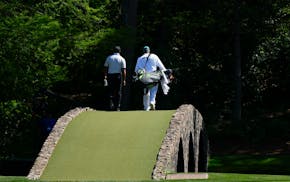As our politicians play hacky sack with the Vikings' stadium issue, I had a chance to speak with local entrepreneur and author Harvey Mackay, who helped earn approval for the bargain and state asset that is the Metrodome.
Tuesday, Gov. Mark Dayton announced that the Vikings will not be able to avoid a referendum to increase local taxes for a stadium, a move that conceivably could lead to the team leaving after its Metrodome lease ends this winter.
Mackay is touring to promote his new book, "The Mackay MBA of Selling in the Real World." When we spoke, it quickly became clear that the conversation would not turn into a debate.
We agree that: Big-time sports offer immense tangible and intangible benefits; the Vikings are the most popular entity in the state; losing them would be an embarrassment to our cities and state; the price of building a stadium only goes up every year; building a stadium creates jobs and stimulates at least a portion of the economy; if we lost the team we eventually would pay three-fold to replace it.
"The most powerful argument is the creation of 7,000 to 8,000 jobs," he said. "That's a really big number. I'm a believer that you have to invest during difficult times. ...
"If you can look at the whole picture, I think the decision becomes much easier. Every time the Vikings are on TV, the numbers are enormous. The last time I checked, Minnesota was mentioned 237 times on a three-hour broadcast. Last week I called up an ad guy and, holy cow, he told me that upwards of 40 percent of the entire state was reached by the Vikings game. That's pretty awesome.
"You've got two million USA Todays reporting on the Vikings, plus the New York Times, Sports Illustrated, all the national publications. There are not enough zeros to measure the number of people made aware of Minnesota through the Vikings.
"I believe the stadium is a jobs issue and a lifestyle issue. I travel everywhere, and you can tell the difference between the cities with big-time sports and those without."
Mackay said he recently hired a president for his company, and that if Minnesota had not possessed an NBA team, the Celtics fan he lured out of Boston would not have taken the job.
"We're competing with adjacent states for jobs," Mackay said. "All these other states want me to take my factory and move it, to find a cheaper place, to pay lower taxes. I think the legislators know what kind of market we're in. It's dog-eat-dog and rat-eat-rat.
"Having major league sports separates us from many other places. And here, we're talking about an owner who's willing to invest $400 million in a stadium that is an asset for our state. If you went to another state and said, 'Here, we want to invest $400 million in your state,' what do you think the reaction would be?
"Put the word 'stadium' in there and everything changes."
Mackay understands that the Vikings, playing in the last year of the Metrodome lease, eventually will leave without a new stadium. Anyone calling that an idle threat hasn't heard of the Lakers, or North Stars, or Colts, or Browns.
"Imagine our state if we had never had the Vikings or the Twins," Mackay said. "Where would be truly be? I believe this: You can't fill all of the key jobs at Medtronic and Honeywell and 3M and Dayton's and Target with just St. Thomas and U of M grads.
"You have to offer a lifestyle for people to come here and work at the kinds of jobs that make a difference in our economy. Especially in this economy."
I believe that the urgency of the Vikings' situation shouldn't obscure what will be best for the state over the next 30 years. I believe we would all be best served by a stadium near Target Field that would serve as a boon to tourism and the local economy. But if Minneapolis can't compete with Ramsey County's offer, so be it.
What everyone should remember as the debate turns risky and complicated is that the costs of building a stadium will be far less than the costs of losing the team, and far less than the costs of replacing the team.
This isn't a "sports" issue. This is a competitive market and quality-of-life issue.
"We can't put this state asset at risk," Mackay said. "You have to understand that the team will leave if we don't act."
Jim Souhan can be heard Sundays from 10 a.m. to noon and weekdays at 2 p.m. on 1500ESPN. His Twitter name is Souhanstrib. • jsouhan@startribune.com

Souhan: Why Tiger Woods should keep swinging
Souhan: Scheffler wins Masters again, shows what makes him special
Morikawa falters in final round at Masters

Keeping up with the Joneses who helped design Augusta National's classic back nine


